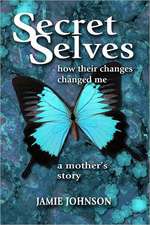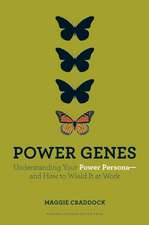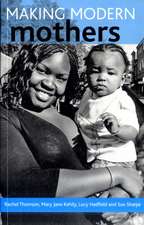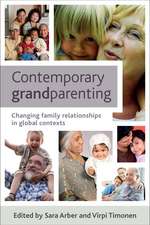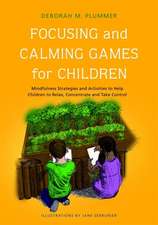Autism and the Family in Urban India: Looking Back, Looking Forward
Autor Shubhangi Vaidyaen Limba Engleză Hardback – 11 oct 2016
The book tackles head on the sombre question, What will happen to the child after the parents are gone ? It also critically examines the role of the state, civil society and legal and institutional frameworks in place in India and undertakes a case study of Action for Autism ; a Delhi-based NGO set upby parents of children with autism. This book also draws upon the author s own engagement with her child’ s disability and thus lends an authenticity born out of lived experience and in-depth understanding. It is a valuable addition to the literature in the sociology of the family and disability studies.
| Toate formatele și edițiile | Preț | Express |
|---|---|---|
| Paperback (1) | 382.18 lei 6-8 săpt. | |
| Springer India – 30 apr 2018 | 382.18 lei 6-8 săpt. | |
| Hardback (1) | 389.49 lei 6-8 săpt. | |
| Springer India – 11 oct 2016 | 389.49 lei 6-8 săpt. |
Preț: 389.49 lei
Nou
Puncte Express: 584
Preț estimativ în valută:
74.54€ • 77.00$ • 62.03£
74.54€ • 77.00$ • 62.03£
Carte tipărită la comandă
Livrare economică 26 martie-09 aprilie
Preluare comenzi: 021 569.72.76
Specificații
ISBN-13: 9788132236054
ISBN-10: 813223605X
Pagini: 296
Ilustrații: XI, 180 p.
Dimensiuni: 155 x 235 x 13 mm
Greutate: 0.45 kg
Ediția:1st ed. 2016
Editura: Springer India
Colecția Springer
Locul publicării:New Delhi, India
ISBN-10: 813223605X
Pagini: 296
Ilustrații: XI, 180 p.
Dimensiuni: 155 x 235 x 13 mm
Greutate: 0.45 kg
Ediția:1st ed. 2016
Editura: Springer India
Colecția Springer
Locul publicării:New Delhi, India
Cuprins
Chapter 1. Mapping the Terrain: Examining Discourses on Disability and the Family.- Chapter 2. “There is something wrong with my child”: Encounter with autism.- Chapter 3. Unending Care and an Uncertain Future: The Challenges of Parenting a Child with Autism.- Chapter 4. Shrinking Circles of Support: The Urban Family in Transition.- Chapter 5. Disability, Society and State: New mobilizations and movements.- Chapter 6. Conclusion: Looking Back, Looking Forward.
Notă biografică
Shubhangi Vaidya graduated in sociology from St. Xavier’s College, Mumbai. She completed her postgraduation and research degrees at the Centre for the Study of Social Systems, Jawaharlal Nehru University, New Delhi. Shubhangi is presently a faculty member in the School of Interdisciplinary and Trans-disciplinary Studies, Indira Gandhi National Open University (IGNOU), New Delhi, where she is engaged in developing open and distance learning programmes. Her current research interests include disability studies, women’s studies and labour studies. She has published both scholarly as well as general articles and book chapters and is co-author (with Anu Aneja) of a book Embodying Motherhood: Perspectives from Contemporary India (Sage-Yoda Press, 2016). Alongside her research and teaching roles, she is an advocate for the rights of persons with disabilities and their families; and is actively involved in awareness-building within the community.
Textul de pe ultima copertă
The book explores the lived reality of parenting and caring for children with autism in contemporary urban India. It is based on a qualitative, ethnographic study of families of children with autism as they negotiate the tricky terrain of identifying their child’s disability, obtaining a diagnosis, accessing appropriate services and their on-going efforts to come to terms with and make sense of their child’s unique subjectivity and mode of being. It examines the gendered dimensions of coping and care-giving and the differential responses of mothers and fathers, siblings and grandparents and the extended family network to this complex and often extremely challenging condition.
The book tackles head on the sombre question, What will happen to the child after the parents are gone? It also critically examines the role of the state, civil society and legal and institutional frameworks in place in India and undertakes a case study of Action for Autism; a Delhi-based NGO set up by parents of children with autism. This book also draws upon the author’s own engagement with her child’s disability and thus lends an authenticity born out of lived experience and in-depth understanding. It is a valuable addition to the literature in the sociology of the family and disability studies.
The book tackles head on the sombre question, What will happen to the child after the parents are gone? It also critically examines the role of the state, civil society and legal and institutional frameworks in place in India and undertakes a case study of Action for Autism; a Delhi-based NGO set up by parents of children with autism. This book also draws upon the author’s own engagement with her child’s disability and thus lends an authenticity born out of lived experience and in-depth understanding. It is a valuable addition to the literature in the sociology of the family and disability studies.
Caracteristici
First book-length study of autism and the family in India Studies issues in sociology of the family that have received scant scholarly attention Benefits parents and other stakeholders to gain a better understanding of their child, network with others and be aware of policies and programmes Includes supplementary material: sn.pub/extras








